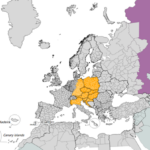If done right, digitalisation in the public sector can be a powerful tool for transparent, efficient, and effective public service provision. Governments throughout the Danube Region implemented various eGovernment services. Thereby, they offer benefits such as digital IDs or electronic medical presicription, lengthy procedures to submit your taxes or register your newborn baby are cut short thanks to online portals that facilitate registration and submission procedures for citizens. Despite all those achievements, the quality and smoothness of electronic public services or interoperability across different administrative levels or across borders still has some room for improvement. Likewise, different countries in the Danube Region developed strategies and solutions that could help others to find their way forward.
This is why the coordination team of Priority Area 10 “Institutional Capacity and Cooperation” organised the Extended Steering Group Meeting on Digitalisation in the Public Sector on 9 October 2024. The workshop aimed at kicking off macro-regional cooperation in the area of digitalisation in the public sector. In doing so, the participants identified relevant factors of successful digitalisation for public administration. Equally, the exchange is a starting point to explore options for cooperation and mutual learning to boost eGovernment approaches in the Danube Region.
The many faces of digitalisation in the public sector
Digitalisation in the public sector starts with digitalisation strategies and ranges from concrete services for citizens to a sound integrated data environment, from data security to re-designing public service provision. Furthermore, digitalisation in the public sectors affects how citizens can interact with public authorities, but also impacts the day-to-day job of public employees.
The example of the Czech Republic showcases how the government program ‘Digital Czechia’ got translated into a steady roll-out of services at all administrative levels. The program is supported by a legislative framework that gets adapted according to the actual needs of digitalisation. In addition, the Government Council for Information Society and the Digital and Information Agency support the program implementation and facilitate coordination across all government agencies. In his presentation, Tomáš šedivec, chief architect of e-government, illustrated the the many dimensions of comprehensive digitalisation as laid out in the ‘Digital Czechia’ program: legal frameworks, data security and infrastructure are as relevant a topic as data sharing, lean service provision and interoperability between all administrative levels.
When it comes to how digitalisation supports public employees’ jobs, Baden-Württemberg has come up with an interesting solution. Johannes Ast from the States Ministry in Baden-Württemberg presented the “F13 AI-Assistant” – basically ChatGPT for public service employees. The F13 software helps civil servants with tasks such as document research, and generating information and content based on government files. In doing so, the software helps public employees to fulfill tasks more efficiently. When designing the government AI tool, a major aspect was the reconciliation of result efficiency results and accountability of results.
Successful digitalisation needs an integrated approach
With many interdependent factors, successful digitalisation needs to based on an integrated approach that takes into account legal framework, state of play of public administration, user-friendly and accessible service provision, technical capacities, and social aspects. Hence, digitalisation strategies and programs that are perceived as successful, pursue an integrated approach that is backed by political will and supported by dedicated agencies that take care of coordination and cooperation across policy sectors and agencies. Likewise, those programs are accompanied by comprehensive stakeholder involvement in order to make sure that all parties involved in providing and consuming services, processing data or (re-)designing services have a say.
Against this background, we identified different aspects of digitalisation alongside the following four categories:
- Legal framework
- Process (Re-)design
- Interoperability
- Funding
The Extended Steering Group Meeting on Digitalisation in the public sector was a string point for further exchange and cooperation in view of boosting digitalisation in the Danube Region and to support partner countries and regions in their policy development and implementation in view of the Europe’s Digital Decade. The summary and presentation of the event will be soon available on our website under Priority Area 10 Steering Group and in our Activities Section.
Further Links
- PA10 Steering Group
- PA10 Targets & Actions
- Website Digital Information Agency Czechia (CZ)
- Website InnoLab Baden-Württemberg (DE)




